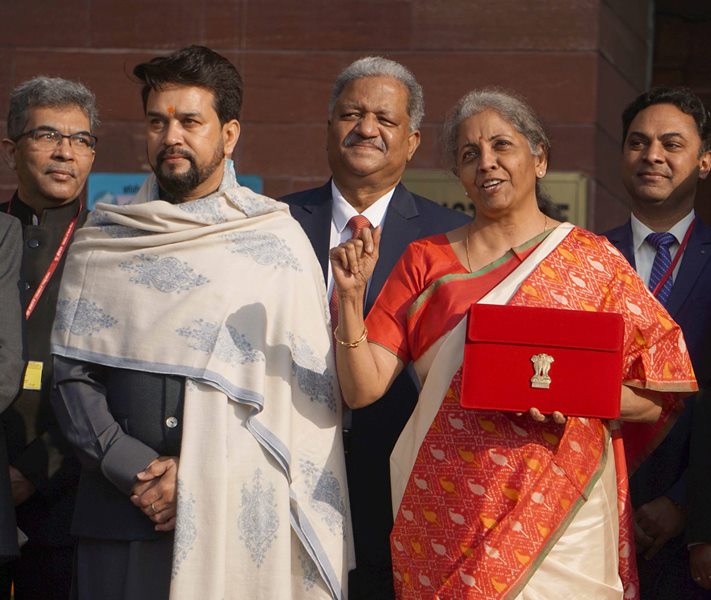 Union Budget 2022
Union Budget 2022
Startups seek 'booster dose' in form of tax incentives from Union Budget
Mumbai/UNI: Amid the uncertainties of the Covid-19 pandemic, Indian startups are pinning hopes on the Union Budget, to be tabled on Feb 1, for a booster dose in the form of tax incentives, reduction in GST and relaxing regulatory restrictions, among others.
Startups are optimistic about a bigger focus by the government on fintech, edtech, healthtech, electric mobility and crypto, among other segments, to ensure an all-encompassing growth.
Data revealed by the Economic Survey, the number of newly recognised startups have increased to over 14,000 in 2021-22 from only 733 in 2016-17, making India the third-largest startup ecosystem in the world after the US and China.
As many as 44 Indian startups have achieved unicorn status in 2021 taking the overall tally of unicorns in India to 83, most of these are in the services sector, the Survey said.
According to Agility Ventures Co-founder Prashant Narang, the startup ecosystem in the country could benefit from tax reliefs and incentives.
"The government should look at providing various tax reliefs for developing infrastructure in the startup ecosystem, especially in Tier-2 and Tier-3 cities. For instance, they can give tax incentives for setting up incubators/ innovation labs. There is also a need to introduce relaxations on capital gains tax for specific sectors like agritech, electric vehicles, healthcare and renewable energy," he said.
Keeping in mind the importance of the role of batteries in the ongoing EV revolution, the upcoming budget must look at mandating charging infrastructure across commercial and residential structures, Neuron Energy Co-Founder Pratik Kamdar noted.
"While the EV industry is gradually gaining momentum in the country and the breakneck developments spurring growth, companies providing auxiliary support to the segment like batteries should also be considered in the upcoming Union Budget."
Owing to the uncertainties associated with the global contagion, many of these SMEs and MSMEs dominantly start-ups have faced the brunt resulting in financial and manpower losses and in some cases even closure of business.
"The Budget should focus on introducing start-up friendly policies and tax relaxation thus encouraging more capital infusion, innovation and ease of doing business," he said.
The industry is also expecting relaxing regulatory restrictions for startups and obliteration of fine prints to give nascent organisations the freedom to surge ahead and generate more employment.
"While the government continues to stage pointed efforts to propel the startup revolution in India, we believe that friendly policies and automation of taxation will allow us time to focus on innovation and scale-up operations," StepSetGo CEO and Co-founder Shivjeet Ghatge said.
Additionally, lowering tax slabs will help boost encouraging investor sentiments and will contribute to the overall start-up boom. It will also allow existing players to access increased capital flow, underscoring the emphasis on increased R&D," he added.
Ayu Health Hospitals CEO & Co-Founder Himesh Joshi opined that the government should look at further easing the regulatory burden for startups, as well as the overall regulatory process which should be completely digitized.
"The government should also engage more people from the start-up the ecosystem to ensure policymaking stays in sync with innovation. In health-tech specifically, there's a blurring line between healthcare providers and health-tech companies, and therefore simplifications in areas like taxation will go a long way," he added.
LogiNext Founder & CEO Dhruvil Sanghvi noted that India saw a euphoric rise in the number of unicorns in 2021 making it one of the fastest-growing technology startup ecosystems globally.
"This growth has been on the back of overall improvement in ease of doing business, and this should continue to remain an ongoing focus and priority," he added.
According to Manas Mehrotra, Founder, 315Work Avenue there is a need to reduce GST to the lowest slab for upcoming startups as it will make a significant impact on their budget.
"Currently, coworking spaces charge a GST of 18 per cent to all clients and this is a big impact to startups. Hence, it can be reduced drastically," he added.
Support Our Journalism
We cannot do without you.. your contribution supports unbiased journalism
IBNS is not driven by any ism- not wokeism, not racism, not skewed secularism, not hyper right-wing or left liberal ideals, nor by any hardline religious beliefs or hyper nationalism. We want to serve you good old objective news, as they are. We do not judge or preach. We let people decide for themselves. We only try to present factual and well-sourced news.







